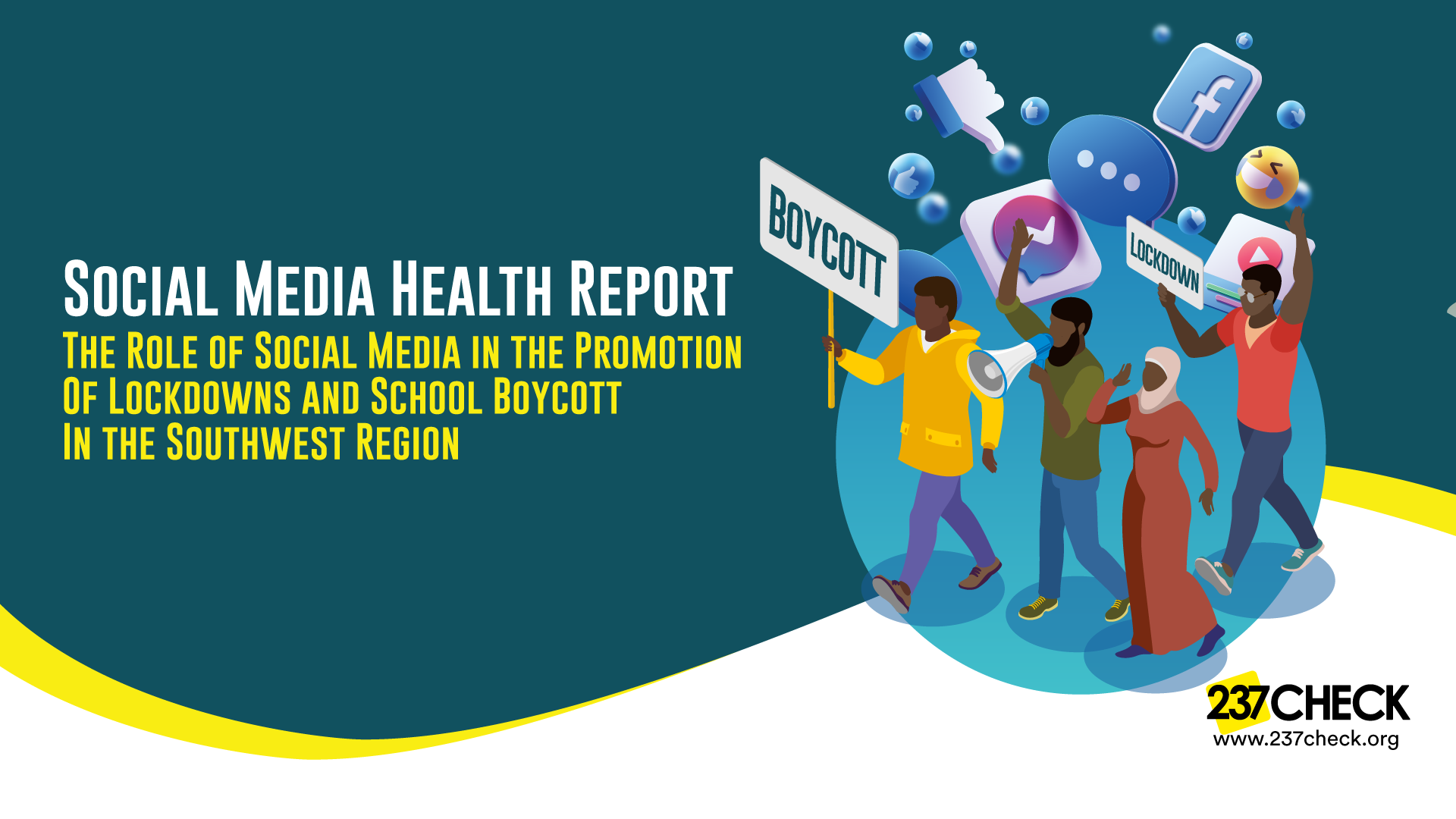Introduction:
Cameroon’s Anglophone regions have been engulfed in crisis since late 2016, when English speaking lawyers, students, and teachers began protesting what they saw as their under-representation in, and cultural marginalization by, the central government. Strike actions to call the government’s attention to these demands attracted severe military punishments which have resulted in an armed conflict. Ghost town operations and lockdowns are imposed on locals in the two regions to close their shops and remain indoors for days and even weeks. The separatists also impose lockdowns across cities, towns and villages in the northwest and southwest regions to ensure that schools remain shut especially when the month of September approaches. The situation has had devastating effects on the education sector as several thousands of school children and students have been deprived of education since 2016. Social media platforms have contributed immensely to the promotion of these lockdowns and school boycotts as they serve as the forum for information dissemination. Several blogs and social media pages circulate information about these lockdowns.
Body:
Right from the start of the Anglophone crisis, several contents are being shared online in the form of write up, videos, photos or records that instill fear in people, thereby causing them to remain indoors. In 2020, Human Rights Watch (HRW) published a story of girl who was tortured and fingers chopped off because books were found in her bag. https://www.hrw.org/news/2020/03/12/targeted-going-school-cameroon
The rise in kidnappings of students and teachers, and burning of educational infrastructures remain a problem in the Northwest and Southwest regions. On the 24th of October 2020, Mother Francisca International Bilingual Academy Kumba was attacked, leading to the death of about 8 pupils and several others injured. This incident was reported by several bloggers and Facebook pages such as; Mimi Mefo Info (https://fb.watch/fS2W_RS6Zb/), Cameroon Current affairs (https://fb.watch/fS1-yfoQKV/, and Eagle News Africa (https://cutt.ly/8BJYmM0), and un-treated images circulated all over social media which instilled fear in the hearts of parents who will have no choice than to let their children stay at home other than going to school.
On August 30th 2022, a video was released announcing a national lockdown from Monday 4th September, to Friday 16th September 2022 this was in a bid to ensure that schools do not go operational. https://fb.watch/fTpHZ7qkks/.
On September 6th 2022, Larry’s News Room shared an update of a car that was set ablaze in Santa. This was done by ghost town enforcers to serve as a warning for all those defying the lock down. https://cutt.ly/8BJTVaE
Still on this September 6th 2022, a primary school teacher by name Che Rhoda was shot on her way to school. This incident was as well shared on social media by several blogs such as Arrey Media
(https://cutt.ly/QBJR4Fc )and individuals.
How social media has played a role in the promotion of lockdown and school boycott cannot be over emphasized. The sharing of untreated images, kidnap and torture of teachers and students, burning of educational infrastructures instill fear in so many parents. Also, images of markets and shops being burnt because owners do not respect ghost towns is another reason why people choose to remain indoors other than bearing risk.
A thematic report of the education crisis in the Northwest and Southwest regions of Cameroon as of February 2021 reveals that 700,000 children are affected by school closure and less than 30% of schools are operational in the Anglophone regions.
https://www.acaps.org/sites/acaps/files/products/files/20210219_acaps_thematic_report_
cameroon_education_crisis_north_west_south_west_region.pdf
Below are links to some posts on twitter which talk about the ghost towns and school boycott situations in the Northwest and Southwest Region;
Day 2 of school resumptions in Cameroon, and the ghost town is still being observed in #Bamenda.
— Mimi Mefo Info (@MimiMefoInfo) September 6, 2022
The streets have been completely blocked today at Below Foncha.
Unlike the Biya government predicted and announced, school resumption in the North West Region remains timid.
MMI pic.twitter.com/JXPYnzSNId
Unrest in Cameroon. #southerncameroons #GhostTown #FreeAllArrested #AJNewsGrid https://t.co/PGH4eG44xU pic.twitter.com/tnaq5yz2ql
— Leah Harding (@LeahHardingAJE) September 6, 2017
Students flee for their lives at the sound of gunshots on Tuesday 5th April 2022, separatist fighters attack the university of Bamenda in guise of a warning for the non respected of ghosttown operation.#Cameroon #Attack #JDChttps://t.co/wMA27GU138
— Journal du Cameroun (@JDC_En) April 7, 2022
Conclusion:
The Anglophone crisis has caused over 900,000 internally displaced persons and 60,000 refugees (Craig 2020; ICG 2019). Thousands of people have fled to the predominantly French-speaking regions and across the border into Nigeria. According to the United Nations Children’s Fund (UNICEF), nearly 850,000 students have been deprived of their right to education since the beginning of the Anglophone crisis, and more than 4,000 schools burnt down. Several pupils and students have lost their lives in the English speaking regions.
Recommendation:
In as much as the situation in the Anglophone regions of Cameroon is a call for concern, and such images and videos need to be shared in order for stakeholders to see how serious the situation is and take actions, these images and videos however need to be treated because untreated images do not only affect the friends and relatives of victims mentally, but also the audience who come across such contents online.
Also, messages, videos and posts that carry information about ghost town should receive a negligible amount of attention and do not share or publicise such content. Indeed, it’s observed that lockdowns and school boycott are more effective because Internet users massively re-share the messages promoting these words. It is therefore important to #ThinkB4UClick
Furthermore, it is more important for the authorities to develop alternatives to the imposition of lockdowns and the boycott of schools; in particular, this involves promoting the telework system and distance learning which can be carried out mainly online.



